|
In the Church, we have a timely liturgical schedule of feasts, seasons, and commemorations. Each year, we practice prayer, fasting, and almsgiving during the season of Lent in order to prepare ourselves for the Resurrection of the Lord at Easter. In Advent, we hear readings from Isaiah that help us to turn our attention to the coming of Christ both in his nativity at Christmas and at the end of time. In addition to these seasons, we also celebrate individual days as part of practicing our faith. On St. Therese’s feast day, we ask for roses to cross our path to confirm her intercession for us. On All Souls’ Day, we remember those who have died and pray for their sanctification. According to paragraph 102 of the Dogmatic Constitution on the Sacred Liturgy, or Sacrosanctum Concilium, in celebrating these feasts and seasons, the Church “unfolds the whole mystery of Christ, from the incarnation and birth until the ascension, the day of Pentecost, and the expectation of blessed hope and of the coming of the Lord.” In other words, the variety of feasts and seasons allow us to contemplate the life and mystery of Christ from different angles. For example, at Christmas, the Church looks with awe upon God becoming human in the Incarnation. On the feast day of the Annunciation, we reflect on God’s total initiative to redeem the human race with the collaboration of Mary’s fiat. Celebrating the witness of the saints on their feast days inspires us that we too can witness to the love of God in large and small ways in our lives. Each of these examples gives us glimpses at aspects of our faith and renews our devotion to “the whole mystery of Christ.” Why is it important to mark particular days and seasons as days to commemorate certain aspects of our faith? Further along in paragraph 102 of Sacrosanctum Concilium, we find the answer: “Recalling thus the mysteries of redemption, the Church opens to the faithful the riches of her Lord's powers and merits, so that these are in some way made present for all time, and the faithful are enabled to lay hold upon them and become filled with saving grace.” In short, celebrating these feasts and seasons help us grow in grace. We hear readings that help us think about what the feast commemorates. We pray particular prayers that ask for the intercession of the saints we celebrate. We participate in special traditions, such as creating offrendas during All Souls Day, or preparing large feasts on the feast day of St. Joseph. Because of the liturgical calendar, we are invited to stop and be drawn into contemplation of the love of God. The love of God is not something we are invited to contemplate only on days or seasons marked by the official liturgical calendar. In addition, we can also continue to allow our attention to be drawn to the love of God in the feasts and seasons in our personal lives. For example, we might keep vigil on a particular date each year to remember the death of a loved one. We might even mark the difficult or challenging events of our lives, such as the date of a breakup, the date of a move away from a former home, or the date of a medical diagnosis. On the other hand, we may call to mind particular dates of joyful occasions, such as the acceptance into a school, a proposal or marriage, or coming home from military service. Just like formal feast days, the informal feast days of our lives also allow us to contemplate the mystery of Christ and the love of God through different lenses. The date of a breakup might remind us of the pain we went through, but the eventual freedom we may have found later on by trusting in God’s providence. Commemorating the date of the death of a loved one each year might give us the chance to reflect on the gift of friendships and relationships in our lives and how they have contributed to our growth and becoming. Keeping memory of the date of an initial medical diagnosis might allow us to think about our reliance on God and remind us to unite our suffering with Christ’s suffering. The anniversary of a wedding or proposal punctuates our lives with gratitude for a partner or spouse. In keeping our own personal liturgical calendar in addition to the Church’s formal liturgical calendar, we are invited to contemplate the “whole of the mystery of Christ” in our own personal lives. We can reflect upon the love and providence of God made manifest not only in the feast days of the Church’s formal liturgical calendar, but also in the significant events in our lives that have drawn us deeper into the mystery of our own relationship with God and others. By punctuating our lives with universal and personal liturgical feasts, we call to mind Christ’s words in the Gospel of Matthew in a profound way: “And behold, I am with you always, until the end of the age” (Matthew 28:20). What are some days or seasons in your life that you might add to your personal liturgical calendar? In remembering these dates, how are you being invited to contemplate God’s love for you?
0 Comments
“Do not let your heart be troubled. Believe in God and also in Me.” - John 14:1-2 Discipling a child is an “inside” job – it begins in the home. I learned about Jesus and the love and mercy of God from my parents first, and as a parent it has been my mission to incorporate practical ways to bring my faith alive for my children to ‘catch’ hold of and form them into disciples. Discipleship leads through example and draws others into a Christ-centered life. Beginning each day with praise and prayer, thankfulness and petition. It can involve sharing a simple breakfast together, encouraging each individual in their specific tasks for school or work, or offering a touch of blessing as they go off into the new day. Other acts can include reading age-appropriate books about our magnificent God and the saints and participating in daily Mass as often as possible. Mass brings every person to the Altar of Love – to the source of our help – ‘the fountain of grace.’ Hearing the Word of God proclaimed and remembering the ultimate sacrifice given for our redemption is full of richness that settles upon and within us. The Mass is our way of participating in the redeeming mercy and love of Calvary and helps keep us on the narrow path when we venture out into our day. Singing songs and playing games that reinforce the fundamentals of our beliefs brings the doctrine alive and becomes a part of our core being. Using all our senses to learn about our Catholic faith makes it an integral part of who we are as individuals commissioned to be Church to the world in everything we do. Throughout motherhood, I attempted to teach our children to serve in all kinds of ways and to look beyond themselves and care for another. In the home, we have endless opportunities to serve each other and share the message that others are valued and important to being the Body of Christ together. I taught sharing, deferred to someone else’s wants first, offered a helping hand, worked side by side to accomplish a task, and simply enjoyed spending time together. This discipling has one goal: to bring each child to a deep understanding of their identity in God and their inheritance from Jesus. It has to be intentional and repeated in the simple day-to-day. There are countless other ways I can disciple and the Holy Spirit helps me make it real and animated as I nurture my communion with Him. Wow, what a calling we have! The first people we “practice our faith” with are right in our own homes! As Christ Himself noted in the Gospels, sometimes this is the most challenging environment. Those who know me the most – who see all my cracks and weaknesses – can more easily dismiss me or even ignore me. Jesus Himself was not welcomed in His hometown. At home, in the raw moments shared with one another amidst the messiness of real life, we are just ordinary people to each other. Yet, in the beauty of the family, God uses the ordinary to bring about the miraculous. Love and sacrifice poured out for each other each day refines us and molds us. In rubbing against each other’s edges, we become the children God created us to be. All this explained – discipling doesn’t assume that when we nurture our children in the faith that it is a done deal. As a mom, I do my part, every day of my life, and pray each child remains captive in the Lord’s heart as they grow and leave. It’s a freedom each of us is blessed with – to one day go forth and be disciples in a new place, apart from parental tutelage. Continuing to disciple adult children is scary and wonderful at the same time, and quite the delicate balance. I share this to remind you that we are all in different stages of being formed and in constant need of being discipled, no matter our age or state in life! My husband and I were blessed with seven children – one in heaven and six living. Of the six, four have chosen to walk away from or live on the fringes of the Catholic Church and the traditions they were raised in. I know I am not alone in this, as other families have children leaving the Church as well. I used to stress over it and worry myself into utter agitation. Gradually, as I practice my faith more fervently, attend Mass, and bring my children in name to the Altar of the Lord, the peacefulness has returned. I am confident that the work that began in them will come to a positive end because what God desires, even more than this mama, is to have each of them with Him in eternity. He will stop at nothing to keep chasing after them! As St. Ambrose instructed Monica as she chased after her adult son, Augustine: “You have done your job. Do not talk to Augustine about God. Talk to God about your son.” I am not in charge of their decisions, but I can continue to grow in making my own choices rooted in Christ and love them no matter what. Jesus shows me ways to love and serve them where they are right now and remind them of their inheritance as a child of the living God. Sometimes it’s speaking encouragement, hard truth, or sharing my struggles. Sometimes it’s performing some act of kindness that exhibits the heart of God to them: little ordinary things like making enough food to include them when they stop by, finishing their laundry when they have to run off to work, sharing a little text message that I love them, an invitation to come play board games, or just being available to listen and keeping the door of communication always open. This also always includes inviting them to join us in the Rosary, coming with us to Mass, or other activities at the parish; not pushing – just extending the invitation. And so, my husband and I continue to walk out each day ‘practicing’ by doing all we can to become better children of God ourselves. We leave the rest to God, Jesus, the Holy Spirit, Mother Mary, Saint Joseph, their guardian angels and all the saints to do what they do best. Discipling is an ‘inside job’- it grows in the living, beating heart of the home – and God works His miraculous through us to draw each of His children to Him. My confidence that He will complete His good work in each of these is secure! Come back to me with all your heart Don’t let fear keep us apart Trees do bend though straight and tall So must we to others’ call. Long have I waited for Your coming home to Me And living deeply our new life Song: Hosea by Gregory Norbet How much time do we spend fretting about the items on our to-do list? Whether it’s a long-term goal or a set of tasks for the day, the pressure to do all things (and to do them well) seems overwhelming at times.
In tomorrow’s feast of the Solemnity of the Annunciation of the Lord, we see how the Blessed Virgin Mary offers us an alternative to our preoccupation with personal accomplishments. Her response to the angel Gabriel’s message focuses instead on God’s initiative. The angel greets her saying, “Hail, full of grace!” (Luke 1:28), or in other biblical translations he refers to her as “highly favored.” Gabriel goes on to describe the greatness of the child she will bear: “He will be great and will be called Son of the Most High, and the Lord God will give him the throne of David his father, and he will rule over the house of Jacob forever, and of his kingdom there will be no end” (Luke 1:32-33). If I imagine myself in Mary’s place, I would find it very hard to resist merely contemplating my merits and basking in the divine recognition I had just received. Our Blessed Mother, however, thinks only of her lowliness before the Lord, identifying herself simply as “the handmaid of the Lord” (Luke 1:38). She knows that her “yes” to the Lord is far from simple. Because she was only betrothed to Joseph, her pregnancy could mean not only shame, but death by stoning. Despite such difficult circumstances and uncertainty as to how this could possibly come about (she asks, “How can this be?” (Luke 1:34)), she trusts in the power of the Most High. Allowing the Holy Spirit to work freely within her, she grants her full assent: “May it be done to me according to your word” (Luke 1:38). She gives no thought to how she can do this, but instead marvels at all that God does. Just a few verses later (Luke 1:46-55), Mary offers her great canticle known as the Magnificat, in which she proclaims the greatness of the Lord and all God’s mighty deeds. In her singular role within the history of salvation, Mary directs all attention to the grace of God that works within her. What a timely message during this liturgical season! It can be tempting to focus on what we have been doing (or not doing) for Lent. Yet this joyful mystery of the Annunciation prompts us to recognize what God is doing within us. After all, the purpose of a Lenten resolution is not simply to achieve a goal we have set for ourselves but to allow ourselves to be transformed by God’s grace. Perhaps in prayer over the next few days we might consider: How has God’s grace been at work in me lately? How can I entrust myself to the power of the Most High instead of getting bogged down in what I need to do and how challenging it may be? How can I allow the Holy Spirit to work in and through me? May our celebration of Mary’s life of charity, hidden sanctity, and faithful fulfillment of God’s will lead us to imitate her example, so that we too may be mindful of the great things the Lord has done in us and for us. 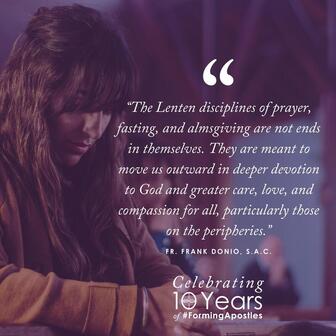 In two days, on the Solemnity of the Annunciation of the Lord, Pope Francis will consecrate Russia and Ukraine to the Immaculate Heart of Mary. He has invited the bishops and priests of the world to join him that day in offering prayer for peace and consecration. The Lenten season is a time for us to intensify our prayer. May we be in prayerful solidarity with Pope Francis on March 25th! Fasting is another aspect of Lent. It provides us a means to purify our body and mind to focus greater attention on love of God and love of neighbor. May our fasting lead us to a deeper encounter with Christ as well as with those who are suffering, abandoned, and marginalized! Lent is also a time to give alms, especially to those who are most in need. There is truly a refugee crisis in many parts of the world, most especially those who are fleeing the war in Ukraine. May we join with those whose lives are uprooted by force and give to charities that are aiding them! The Lenten disciplines of prayer, fasting, and almsgiving are not ends in themselves. They are meant to move us outward in deeper devotion to God and greater care, love, and compassion for all, particularly those on the peripheries. May the Charity of Christ urge us on! In God, the Infinite Love, Fr. Frank Fairly recently, we taught my son to say grace before meals. He contributes by saying, “Amen” and folding his hands. My husband patiently encourages him to keep them folded and he knows we pray before he eats. He even got his Grandma to say “Amen” when they’re together. It’s the sweetest thing and fills my heart with hope. Saying, “Amen” got me thinking though: What a perfect word to carry my family through Lent this year!
Think about it: what do we say to begin and end prayer? Amen. The Creed, the Our Father, the Hail Mary, our spontaneous prayers–every prayer ends with Amen. The faithful participate in the Great Amen in the Eucharistic liturgy at Mass, As the USCCB explains, “The Eucharistic Prayer concludes with the Final Doxology…The people respond with the Great Amen a joyous affirmation of their faith and participation in this great sacrifice of praise.” What exactly does “Amen” mean though? The Catechism elaborates when discussing the Creed, “In Hebrew, amen comes from the same root as the word ‘believe’...Amen expresses both God’s faithfulness towards us and our trust in him.” (CCC 1062). This seems pretty powerful for a Lenten reflection on God’s love and mercy. God’s faithfulness endures. By responding with Amen, we acknowledge this faithfulness and express our trust in him. The section goes on to say, “To believe is to say ‘Amen’ to God’s words, promises, and commandments; to entrust oneself completely to him who is the ‘Amen’ of infinite love and perfect faithfulness” (CCC 1064). When we say Amen, we are saying “I believe” –a beautiful reiteration of our Baptismal vows. I believe. Amen. I believe. I’m certain my two-year-old son already sees God in so many things. Already, he has many opportunities to acknowledge God’s faithfulness: After grace when he says Amen, at Mass when he closely watches the priest lift the host in consecration, and at bedtime when he says goodnight to Jesus. And through my son and his budding faith, I also see God. My son’s namesake, St. Vincent Pallotti, spoke about finding God when he said, “Seek God and you will find God. Seek God in all things and you will find God in all things. Seek God always and you will always find God.” This is such a practical application of big concepts in our understanding of God, perfect for a child to consider as he grows in faith and as we accompany his journey in life. “Seek God always and you will always find God” is also a great phrase to take to prayer this Lent. I think it will continue to help shape my prayer during this season of reflection. As we continue throughout Lent, consider these different aspects of our faith. Every time you say Amen, I invite you to reflect on who you are saying it to and what you believe. May you more earnestly seek God, find God, and trust in his faithfulness throughout your life and during this time of prayer, fasting, and almsgiving. Lent can be a powerful season for us, fortifying our hearts with Christ at the center. As Vinny learns more about prayer, I hope that I can continue to teach him about our Faith, the faithfulness of God, and how to “Seek God” in order to find him. Amen, I believe. Catholic Church. Catechism of the Catholic Church. 2nd ed. Washington, DC: United States Catholic Conference, 2011. http://www.usccb.org/beliefs-and-teachings/what-webelieve/catechism/catechism-of-the-catholic-church/epub/index.cfm Ever since creation, mankind has had to battle against evil. In every age, Satan has been prowling about seeking to destroy, attempting to separate us from our life in Christ. Fortunately, because God cares for us so immensely, He has given us countless tools to equip us in this battle. Romans 8 reminds us: “What will separate us from the love of Christ? Will anguish, or distress, or persecution, or famine, or nakedness, or peril, or the sword?... For I am convinced that neither death, nor life, nor angels, nor principalities, nor present things, nor future things, nor powers, nor height, nor depth, nor any other creature will be able to separate us from the love of God in Christ Jesus our Lord.” However, because our loving God created us in freedom, it is a daily act of the will to remain in His love and under His umbrella of protection. We have resources to help in the fight against evil, as well as advocates we can call upon to accompany us in driving away the demons that seek our ruin. One such advocate whom we celebrate today is St. Patrick. A simple young man who was sold into slavery to Ireland in the 5th century, St. Patrick ultimately gained his freedom and chose to return to the land of his captivity as a missionary to spread the love and truth of God. While in captivity, Patrick prayed constantly and nurtured his faith to overcome the harsh circumstances, and God strengthened him to grow into a saintly superhero known for driving out demons. His prayer, the Lorica (otherwise known as St. Patrick’s Breastplate), is comprehensive in covering all the ways we can be attacked by evil. It is a beautiful prayer that my husband and I pray aloud together each morning; and I can attest to its protection in many incidences. The act of reciting this prayer brings a spiritual covering over us when prayed in faith. St. Patrick is celebrated annually on March 17th, a feast day which occurs during the season of Lent. Today, we can attend Mass on this day and enjoy a traditional Irish meal and festivities as we remember the gift Patrick gave us by his example of driving out evil and spreading God’s love amidst treacherous conditions. He is a bigger than life example for me of how God can equip us with His power to do battle against evil. And Lent is a perfect time in the Church year to remember and celebrate him. During the season of Lent, we focus on our individual weaknesses that allow evil to creep into our lives and practice ways to defeat the darkness within and around us. We look inward and examine our thoughts, words, and actions through prayer, fasting, and almsgiving. These three Lenten pillars can be physical ways to drive out evil influences, reorient our hearts and minds to serve others, and recommit to living in Christ. Having such a superhero of faith as Patrick helps me realize that I need help and cannot do it on my own. Cardinal John Henry Neumann reminds us: “We are not our own masters. Through creation, redemption and regeneration we are God’s property and He has a triple claim upon us. We find that independence was not made for us – it’s an unnatural state, and will not carry us on safely to the end. We are creatures and have two duties – to be resigned and to be thankful.” So, I contemplate during this season of Lent that I am in need of a Savior! Each day I need to rededicate myself to more time in self-examination and prayer for divine assistance to battle against the evil in my life. The Church offers us ways to walk with our brothers and sisters through the Stations of the Cross, to redirect us to follow in Christ’s footsteps. There’s great power in doing this together, as most battles are won by an army working together. Other suggestions for becoming more adept in driving away the demons and battling evil are:
Lastly, I encourage you to adjust your armor daily as instructed in Ephesians 6:11, 14-18: “Put on the full armour of God so as to be able to resist the devil’s tactics. So, stand your ground, with truth a belt around your waist, and uprightness a breastplate, wearing for shoes on your feet the eagerness to spread the gospel of peace and always carrying the shield of faith so that you can use it to quench the burning arrows of the Evil One. And then you must take salvation as your helmet and the sword of the Spirit, that is, the word of God. In all your prayer and entreaty keep praying in the Spirit on every possible occasion. Never get tired of staying awake to pray for all God’s holy people.” Through Christ and the intercession of the saints, particularly St. Patrick, I can wholeheartedly enter into these weeks of Lent to learn more precisely how to drive out the evil in my own life so I can be more disposed to proclaim the love of Christ in who I am and what I do. May you have a Lent filled with freedom from all evil and experience a deep renewal in living for Christ! For more Lenten resources, please click here. To learn more about St. Patrick, please click here. I remember singing the songs over and over again and thinking, “I can’t wait to teach these to my children.” I envisioned us waking up to greet the day with certain hymns, humming them during chores and tasks, listening to them during meals, or resting our heads with their familiar words in the air. Years later, they are barely known. Yet they resurrect in my heart and on my lips as I wash the dishes after bedtime, exhausted but experiencing a newfound contentedness. “In the Lord, I’ll be ever thankful. In the Lord, I will rejoice. Look to God, do not be afraid. Lift up your voices the Lord is near. Lift up your voices the Lord is near.” At some point, the music stopped. I found myself too frazzled by all the other noise to add any more. There were constant questions to be answered like, “How are popsicle sticks made?” and “Is heaven farther than outer space?” There were sibling squabbles to ameliorate, stomping to quiet, odd raspberry noises during meals made by silly little boys to redirect. Throughout motherhood, I have often found my head and heart pulled in all directions at once – caring deeply for my little family, attempting to be present to each of my children, nourishing them, educating them, creating a clean environment for them, being a good spouse, daughter, sister, parishioner, friend. There have been people to pray for, close by and across oceans. There have been bad habits to overcome. There has been communication to improve on. Works of mercy to be lived. On top of everything, a digital life to participate in and comment on—my own and the lives and reflections and insights and meals of others. How could I be adding more noise? It seemed too much. But Scripture, especially when sung in hymns, is not noise. And so, I found myself the other day on Ash Wednesday standing at the kitchen sink after bedtime singing. “In the Lord, I’ll be ever thankful. In the Lord, I will rejoice. Look to God, do not be afraid. Lift up your voices the Lord is near. Lift up your voices the Lord is near.” In spite of a long day, with dishes still strewn about, sticky counters, and a kitchen floor sprinkled with crumbs, I found myself singing. In spite of the laundry that needed to be moved to the dryer, I found myself singing. In spite of the article I still needed to write and the prayer I still needed to rest in, I found myself singing—with joy and renewed in strength. This is what I love about hymns and Scripture. They so often speak the words of my heart that I cannot find the strength to compose myself. This is so true especially of the psalms. In this case, I was prompted by the Holy Spirit, who reminded me of the words and melody. And I responded with an act of the will. It was a small moment where I said “yes” to the Lord and an example of how he gave me the strength to carry on in my vocation. The words never would have erupted from my heart otherwise. Instead of thanksgiving, I could have muttered complaint and grumbled through my late-night tasks. I could have given up and gone to bed, promising to wake up early and take care of things in the morning. I could have ignored the song of my heart. But as I hummed and sang aloud, I remembered that we were made for praise, for worship. These are so deeply part of our identity and humanity. Creation praises the Creator. When we praise and give thanks, we live out our deepest identity. Selfishness, ego, and pride melt away, leaving humility and a rightly-disposed heart. And that’s something God can work with. I’ve had so many ideas for how to experience renewal this Lenten season, but that evening, the Lord revealed his plan for me. My yearning to quiet the noise is worthwhile and important. I can do that by eliminating as many distractions as possible and creating boundaries for the information I process and encounter. I can set times to check my email. I can put my phone in the other room during the day. I can set a limit to how much I go online or scroll. But I can also keep singing. My goal for this Lenten season is to remember and rest in my belovedness. And I think praising God and singing in gratitude, small as it may seem, will help me remember. “In the Lord, I’ll be ever thankful. In the Lord, I will rejoice. Look to God, do not be afraid. Lift up your voices the Lord is near. Lift up your voices the Lord is near.” I often find Lent to be a struggle. I’m the sort of person who likes to set goals and achieve them. Typically, this translates into making lofty Lenten resolutions, trying to rid myself of every bad habit, and ending up disappointed and disheartened when I fall short. When I heard the readings on the final Sunday before Lent, they seemed to be calling me to break out of this pattern. These readings, just a few days before Ash Wednesday, do not issue a challenge to achieve ambitious spiritual goals. Rather, the readings speak to us of growth and fruitfulness. The first reading sets the theme by describing how “The fruit of a tree shows the care it has had” (). Similarly, in the Gospel, Jesus reminds us that “every tree is known by its own fruit” (Luke 6:44-45). Sirach 27:6). Similarly, in the Gospel, Jesus reminds us that “every tree is known by its own fruit” (Luke 6:44-45). This theme of fruitfulness is woven throughout Scripture. In the Gospel of John, Jesus commands the disciples to “go and bear fruit that will remain” (John 15:16). Pope Francis describes bearing fruit as one of the identifying characteristics of missionary disciples. His description of the Church as an evangelizing community contains wisdom that can be applied to our approach to Lent: “An evangelizing community is always concerned with fruit, because the Lord wants her to be fruitful. It cares for the grain and does not grow impatient at the weeds. The sower, when he sees weeds sprouting among the grain does not grumble or overreact. He or she finds a way to let the word take flesh in a particular situation and bear fruits of new life, however imperfect or incomplete these may appear” (Evangelii Gaudium, 24). What if instead of thinking about what I should be giving up for Lent or how I’m doing with what I resolved, I reflected on how I can allow this Lent to be a season of growth and lasting fruit? Shifting our focus and directing our attention to the fruit that God wants our lives to bear opens us up to the possibility of new life. It reminds us that this Lenten journey is not about achieving something on our own merits. It is the Lord, the sower, who scatters seed generously and brings forth new life. Pruning all that is unhealthy is an important part of the growing process, yet our focus is not on what we leave behind. When we set our eyes on the good fruits God is bringing about, we maintain a much healthier perspective. Instead of getting caught up in feelings of defeat or failure for missing the mark, Lent can truly prepare us for the newness of life we celebrate in a special way during the Easter season. Lenten resolutions are a good and worthwhile practice, but we must be careful not to lose sight of their greater purpose. They are not about giving up something as if that were the end in itself. Giving up sweets or putting limits on our binge-watching is not simply about an exercise of willpower. They are meant to open us up something more. Instead of seeing our Lenten resolutions as a “no” to something, we can see them as a “yes” to caring for our well-being, a “yes” to more time for prayer and meaningful conversation with friends and family. These are the lasting fruits toward which such disciplines are intended. As we continue our Lenten journey, let us not grow impatient at the weeds that crop up and threaten our good intentions. Let us not grumble or overreact when we stumble. Rather than giving in to feelings of defeat and failure, let us allow God’s grace to take root in us and renew us so that we may bear fruit that will remain, no matter how great or small it may be. I came upon St. John of God not because of his story--which has distinct similarities with that of his Spanish counterpart Ignatius Loyola--but because of one of his patronages. I found myself dealing with heart issues about a year and a half ago and began searching for a saint whose intercession I could pray for. The Catholic Church has a saint for just about everything, so I knew I’d likely find someone. I found St. John of God and immediately began praying his novena; he’s remained with me since. St. John of God’s story is a fascinating one. He left his biological family when he was about eight years old to follow a priest who had interested him with his tales of the new world. John then fell sick and was nursed back to health by the person who would later adopt him. Around the age of thirty, John entered the Spanish army and went to war against France. Like Ignatius, John lived a life of sin and revelry while a soldier. It wasn’t until an accident (he was thrown off a horse instead of shot by a cannon ball like Ignatius) that he decided to reform his life. After finally leaving the army, John went off to Africa with the goal of aiding Christians and potentially becoming a martyr. He was told that seeking martyrdom was not a good spiritual practice and eventually returned to his native Spain. He later worked at a religious bookstore until he heard a homily from St. John of Avila which led him to sell all of his books and to give the money away. For this uncharacteristic behavior, he was taken to a mental hospital and, after his release to the main hospital, began to help take care of the other patients. This led John to start his own hospital and eventually found the Brothers Hospitallers. He did this, like many things, out of great love for others, the same love which led him to his death after he attempted to save a boy from drowning. St. John of God’s life can teach us so much. His life of revelry and constant back and forth changes in his spiritual life will seem quite familiar to some. Fascinated by God at an early age, living in revelry and sin in young adulthood before finally returning to God, and dedicating his life to God is a very common story. He lived his later life in a way that led him to follow his heart. These actions led others to ridicule him and even got him thrown into the hospital for mental health concerns, but that didn’t stop him. He allowed his heart, guided by what he discerned to be God’s will, to lead him in his life. St. John of God is truly patron of the heart, not only in its ailments, but for all of those who live life by following God’s promptings in their hearts. May we follow our hearts when they are open to and guided by the Word of God and the Holy Spirit. To learn more about the saints, visit our Catholic Feast Days Website by clicking here.
On the Center’s Feast Day Website, March is the month with the least number of feast days, 11 in total. But, this doesn’t mean that there isn’t a range of saints and life experiences represented this month. Two of the saints in March are perhaps some of the most well-known saints: St. Patrick and St. Joseph. Also this month, we will celebrate a famous American saint, St. Katharine Drexel, an influential Peruvian, St. Turibius of Mogrovejo, and one of my favorite saints, the Salvadoran St. Oscar Romero. St. Katharine Drexel St. Katharine Drexel was born in 1858 in Philadelphia. She was born into a wealthy family and inherited a large sum of money after her father died. Katharine and her sisters wanted to help Native Americans and African Americans with the money they inherited. In a private meeting with the pope, he recommended that Katharine become a sister to carry out the work she wanted to do. Doing this, however, would require Katharine to leave the affluent social circles of Philadelphia. She decided that she was being called to religious life and founded the Sisters of the Blessed Sacrament. To this day, the Sisters founded by Katharine continue to work for the education of Native Americans and African Americans across the United States. I find St. Katharine Drexel’s life particularly admirable because of the courage it must have taken to step into the unknown of founding a religious community even though she had such security in the wealth of her inheritance. St. Turibius of Mogrovejo The feast of St. Turibius of Mogrovejo is celebrated on the day of his death, March 23rd. He became archbishop of Lima, Peru in 1580, moving from his native Spain to Peru to be the archbishop. While he was archbishop, he focused on evangelization throughout his diocese. This included many, many baptisms, including baptizing eventual saints Rose of Lima and Martin de Porres. Turibius also focused on incorporating the indigenous languages into the work of the priests throughout the diocese. Personally, I think St. Turibius’ wisdom and understanding carries many lessons for us today. His ability to go into an unknown place and work with the local community can be a model for our efforts in the New Evangelization. Let us not forget the local community and culture of where we might minister, but collaborate with the culture and community. St. Oscar Romero One of my favorite saints is St. Oscar Romero. I did not know much about the life of St. Oscar Romero until I visited El Salvador in 2019. While I was in El Salvador, I got to visit his tomb as well as the chapel where he was celebrating Mass when he was killed. Romero was named the archbishop of San Salvador in 1977 because he was considered a safe, non-divisive choice in the country that had extreme political unrest. However, Romero saw the extreme suffering of the people of El Salvador and devoted himself as archbishop to speak out against the injustices faced by Salvadorans. He knew that doing this put his own life in extreme danger, but he was willing to do so to help Salvadorans. In 1980, after only 3 years as archbishop, Romero was shot and killed while celebrating Mass. Today, Romero is one of the most well-known and respected Salvadorans. Whether you know a lot or nothing at all about St. Oscar Romero, I encourage you to read more about his life, especially the homilies and speeches he gave to all of the people of El Salvador. This March, let us learn more about the lives of St. Katharine Drexel, St. Turibius of Mogrovejo, and St. Oscar Romero and ask for their intercession in our lives and in the life of the Church. To learn more about the saints, visit our Catholic Feast Days Website by clicking here. To view a calendar of the feast days in March, and each month, click here.
“For he knows our frailty, He remembers we are only dust”--St. Thérèse of Lisieux Since Lent of 2022 is already upon us, I would like to pause and reflect on how Lent is a deeply penitential season that can bring us closer to Christ through our love of Him and those around us. I want to consider this by examining St. Thérèse of Lisieux, the Little Flower, and the concept of Merciful Love. St. Thérèse of Lisieux was deeply attuned to Jesus’s love and mercy for all mankind, especially when it came to little souls who had a repentant heart. St. Thérèse expresses her devotion to the Divine Mercy across her many writings, and her insights shaped her “Little Way” into Jesus’s merciful heart as it is poured out to sinners. However, many reject Christ’s mercy, not believing it to be the free gift it is. In my opinion, this is one of the hardest realities to accept in the spiritual life because of its ubiquitous nature. As humans, we are constantly anxious that we are offending God, inadvertently hurting those around us, and making mistakes in our day-to-day lives at work or in school. But no matter the situation, anxiety, or fault, Christ’s mercy enters that space and works to heal us, even if we do not acknowledge it or if we reject it outright. Jesus comes to us and can live in us no matter what. St. Thérèse points to Jesus’s Infinite love and mercy as a model for our own love. In Story of a Soul, she writes, “How good is the Lord, his mercy endures forever! It seems to me that if all creatures had received the same graces I received, God would be feared by none but would be loved to the point of folly; and through love, not through fear, no one would ever consent to causing Him any pain.” Lent is a time of Prayer, Fasting, and Almsgiving that is focused on love of God and love of neighbor. The three core pillars of Lent are not ends in themselves; they are a means to grow closer in relationship to Jesus, the Church, and those who live in our communities. Christ offers us his love and mercy so that we can extend them to those around us, and once we accept His gifts, we are changed forever. Nevertheless, one must trust God in His love, and we must see ourselves as reflections of His love. Much of St. Thérèse’s writings and spirituality revolve around being a small child before God. Our littleness allows the Lord to love and minister to us as He intended since we cannot attain the heights of the Christian life on our own. Instead, Jesus and the Holy Spirit draw near to illuminate the darkness in our lives with their love. Yet, despite the presence of Christ in our lives, we turn away from Him, and this then allows us to run back to Him as the Prodigal Son did. This turning back to God fosters deeper trust in God within our hearts. St. Thérèse enunciates that we have to receive and accept our brokenness and the reality that we will never be perfect. Once this occurs, we gain a relationship with Jesus. Through His love for us, we see ourselves as a vessel for His love. We value our own selves as well as helping those around us. We Christians move outward to love the world as Jesus called us to do through God the Infinite Love and Infinite Mercy. To learn more about the saints, visit our Catholic Feast Days Website by clicking here.
|
Details
Archives
July 2024
Categories
All
|
About |
Media |
© COPYRIGHT 2024 | ALL RIGHTS RESERVED





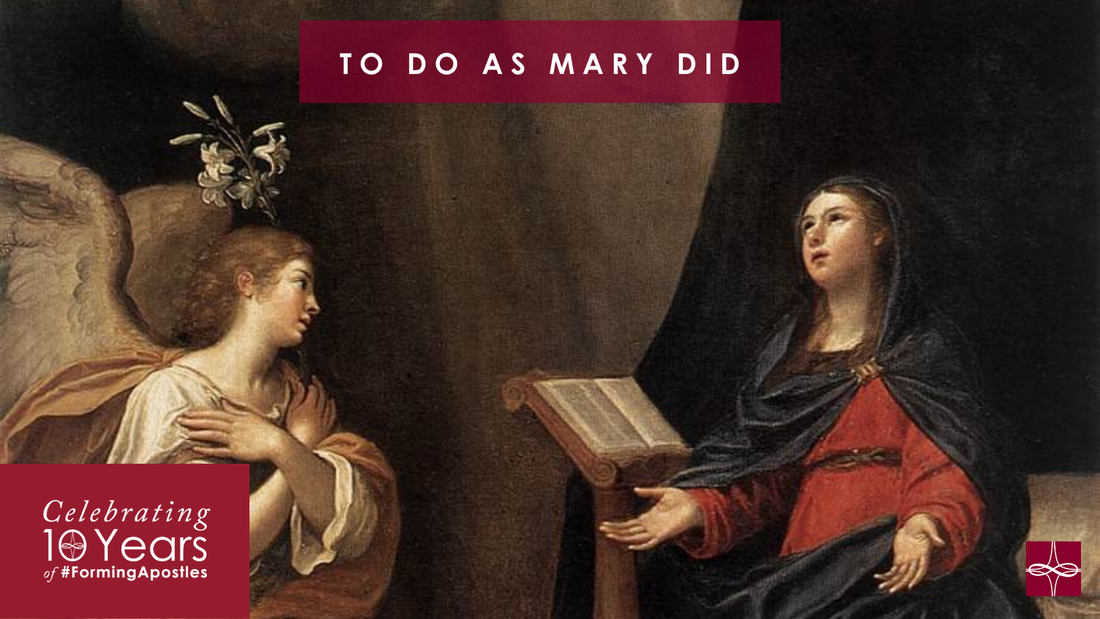

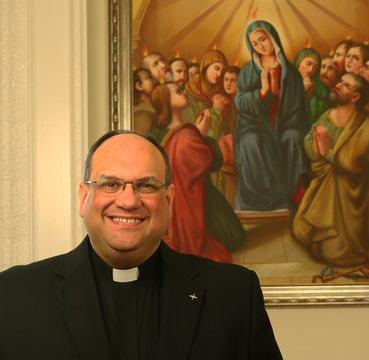
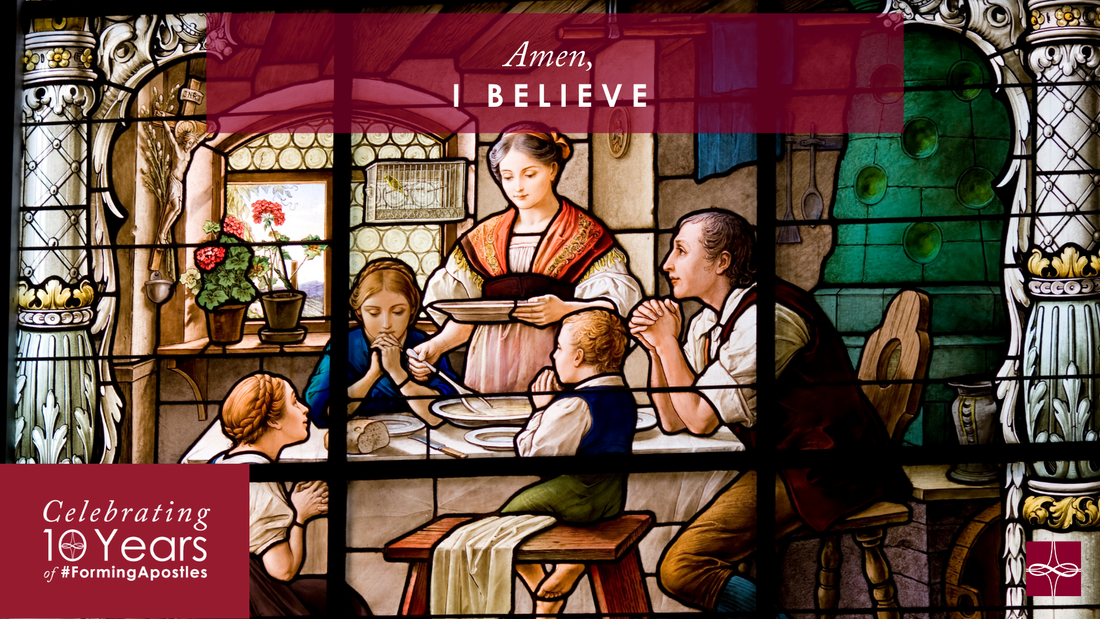






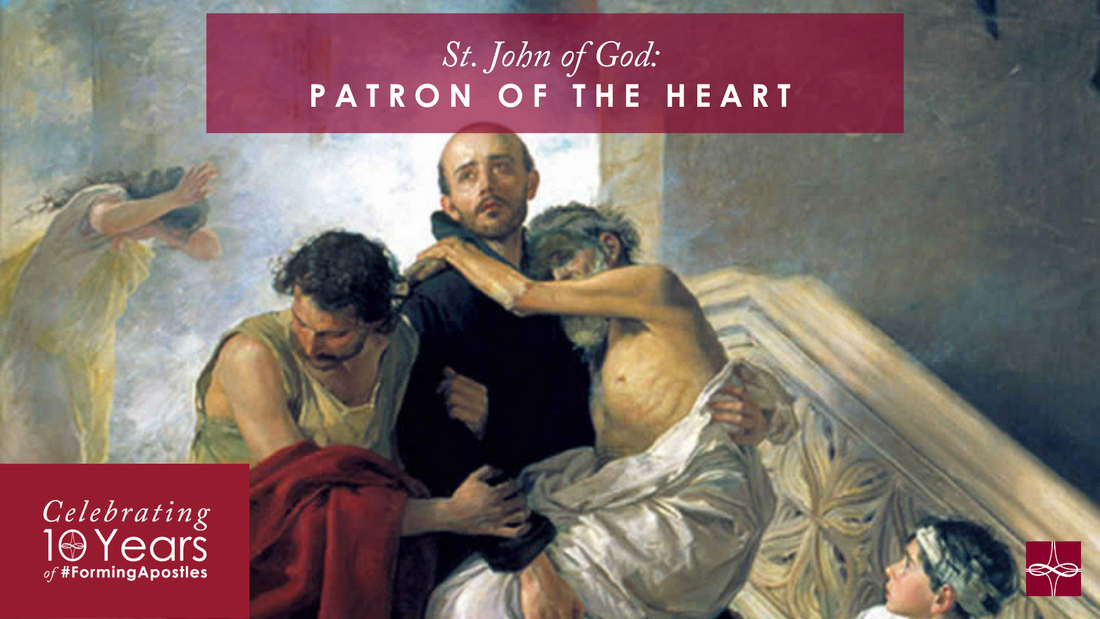





 RSS Feed
RSS Feed